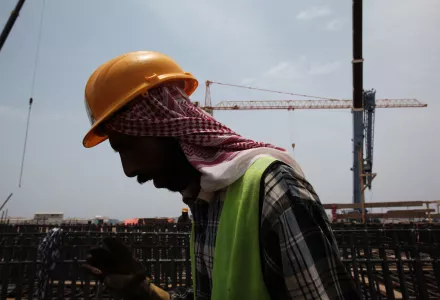
BEIRUT - Nearly two years after oil prices began their precipitous decline, leading global producers are facing the prospect of major adjustments that will have far-reaching economic, social, and political consequences. While such adjustments will surely be enormously challenging - especially for middle-income countries like Saudi Arabia, which lack the massive wealth funds of, say, the United Arab Emirates - they present these countries with an important opportunity to consider more productive ways to organize their societies.
It seems that Saudi Arabia has embraced this challenge. This week, it issued its Vision 2030 plan for ensuring sustainable long-term growth. The plan has been both hailed and criticized for its ambition, exemplified by the goal of turning the Kingdom into the world's 15th largest economy over the next two decades - an economy characterized by its skilled labor force, open markets, and good governance. One key way Saudi Arabia hopes to achieve that is by diversifying its asset portfolio, selling shares in the state oil giant Aramco to create a sovereign-wealth fund.
But Vision 2030 fails to address one critical issue: low labor-force participation. Only 41% of the working-age population currently is employed, compared to a 60% average across the OECD. Those who do work are employed largely by overstaffed public agencies. This is the Saudi economy's largest inefficiency, and addressing it will be more difficult that addressing any other.
The key will be not just to increase employment, but also to boost productivity. After all, unlike more sparsely populated Gulf Cooperation Council (GCC) members, such as the UAE and Qatar, Saudi Arabia, with its population of nearly 20 million (excluding non-nationals), can no longer afford low labor productivity. Indeed, oil revenues now amount to only $5,500 per capita - far from enough to act as a sustainable alternative.
To succeed, Saudi Arabia will have to transform its incentive structure, so that Saudis, not migrants, fill newly created private-sector jobs. As it stands, the Kingdom's underlying political settlement depends on the royal family's alliances with businesses, which have a free hand to import labor, and guaranteed public-sector jobs for citizens.
This settlement is traceable to the 1970s, when ambitious infrastructure programs turned local trading families into contractors, which then lobbied for more visas to staff up. As these firms evolved into mighty commercial and industrial companies, cheap foreign labor became central to their profitability. The GCC is now the only region open to global labor, ensuring that its businesses have the world's lowest wages-to-skill ratio.
As a result, the Kingdom's reliance on foreigners has no parallel in modern economic history. In 2015, there were about nine million migrant workers in Saudi Arabia, constituting 60% of its labor force. The private sector has become a preserve for expatriates, who fill at least 83% of positions.
In few other countries would nationals accept such open competition by foreign labor. Saudi nationals do, because they are employed by the state at above-market "reservation" wages. Roughly 3.4 million Saudis currently work in public administration and the security forces, at wages 2-4 times those in the private sector. If the wage gap between migrant and Saudi public-sector wages does not narrow dramatically, nationals simply will not be employable in the private sector.
But whenever the Kingdom has tried to reduce public-sector hiring, unemployment has increased. Under the current incentives system, the authorities' plans to privatize companies and improve civil-service productivity will actually destroy jobs occupied by Saudis.
The challenge of creating jobs for Saudis may seem like a problem of riches. Some would argue that all the Kingdom needs to do is to substitute Saudi for foreign workers in existing positions. But simple substitution will not do. Current jobs are either too skill-intensive or not skill-intensive enough.
Structural change will be needed to upgrade manual jobs. Greater reliance on capital and technology will also eliminate many menial positions. At the same time, many high-skill jobs, largely a product of massive energy and capital subsidies, need to be downgraded to create more medium-skill positions. Companies must not only pay sufficiently to attract Saudis into these positions, but also begin training them, in order to boost productivity.
All of this presupposes that the labor market will become much tighter. The productive solution thus requires a dramatic reduction in the number of foreign workers, so that private-sector wages can rise to levels commensurate with Saudi reservation wages. The alternative is to slowly become a poor welfare state.
The Kingdom has thus embarked on a "Saudization" program that requires businesses in some sectors to hire nationals. So far, the private sector has largely resisted these policies. Managing the labor market by decree is difficult. More effective methods to ration migrant jobs will have to be found, requiring both regulatory capacities and political will.
Already, official unemployment stands at 11.6% - and at 32.8% for women and 29.4% for young people - while the rate would likely be much higher if discouraged workers were included. More than 200,000 young people enter the labor market annually. And as education levels continue to rise - nearly two-thirds of Saudi youth go to university - social pressure is set to grow as well.
The real constraint to job creation in Saudi Arabia is found in its particular political economy. With lower oil rents to share, the domestic social contract is coming under strain. Cutting support for either businessmen or the population will weaken it further.
How the ruling House of Saud will adjust remains uncertain. Backing the country's entrepreneurs may require a rise in repression; backing the population will generate demands for democratization down the line. Either way, the choices made, whether implicit or explicit, will be profoundly important to the success of Vision 2030 and similar reform agendas.
Diwan, Ishac. “Saudi Arabia’s Reform Path.” Project Syndicate, April 29, 2016


